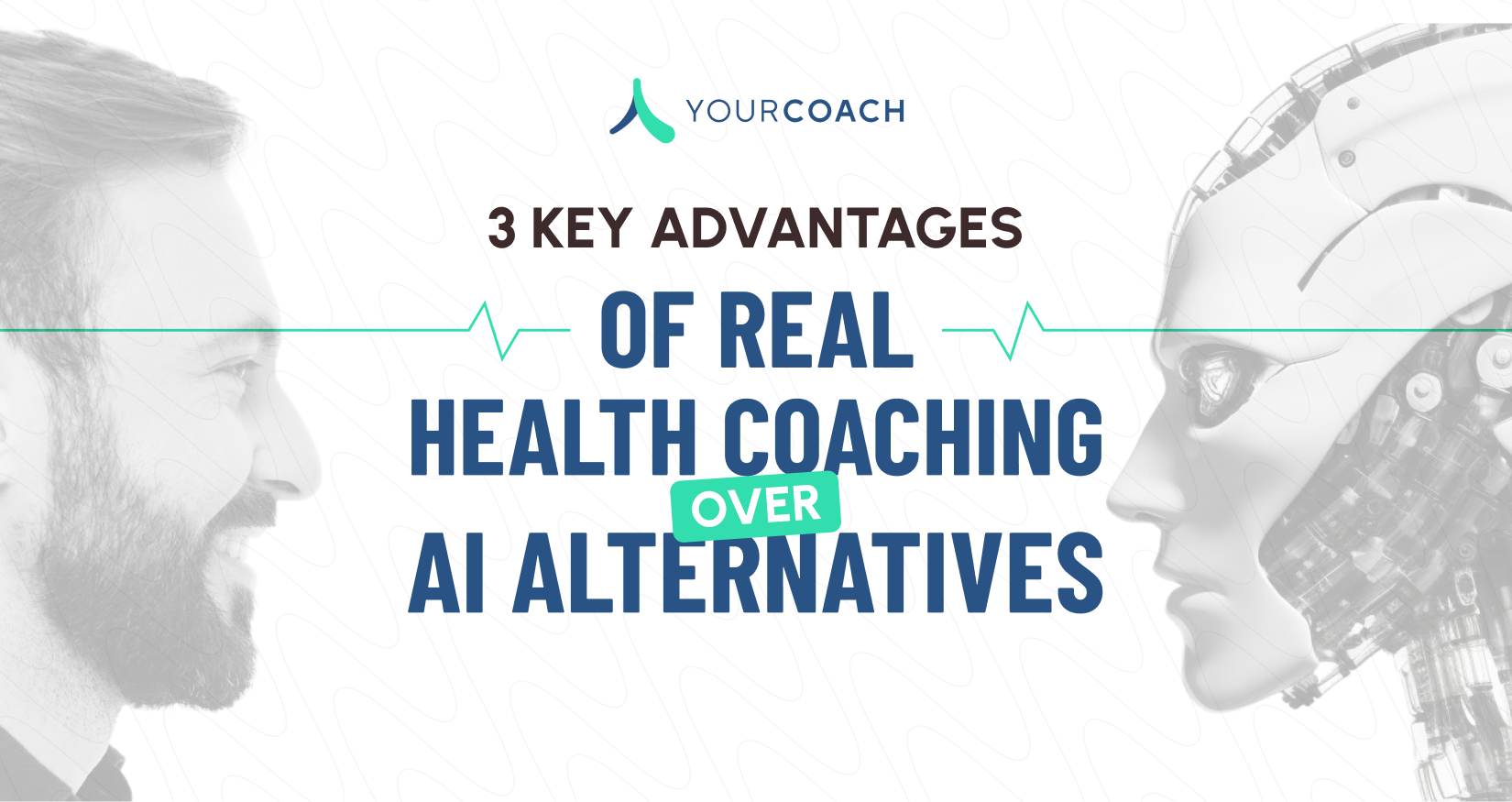
One of the most frequently discussed – and hotly debated – topics within health and wellbeing at the moment is how to ethically and efficiently integrate artificial intelligence into ongoing interventions. AI undoubtedly presents attractive solutions for creating personalized approaches to health and care and provides efficiencies that are often much-needed. But we’ve always said AI is nothing without a human eye and that for the foreseeable future, the human eye is still greater than AI! When it comes to health coaching, human empathy, judgment, experience and training play a crucial role in understanding individual needs and nuances.
Over the last several months, we put AI to the test in our “Coach vs. Code” series across our social platforms. Each segment challenged AI with a real-world health concern (ones we’d heard firsthand from YourCoach health coaches working with real employees, clients and members through our partnerships) and compared its response to that of a REAL, human health coach.
The results showed poignant differences in approach, underscoring the key contrasts between working with an AI coach and a human health coach. Not only that, but we went out on the streets of New York and asked people a simple question: “Would you prefer working with a human health coach or an AI coach?” The answer was unanimous – 100% of respondents said they’d choose a human health coach! This sentiment reinforces what we’ve always known, when it comes to health coaching, empathy, understanding, and personal connection are irreplaceable. In today’s blog, we dive deeper into three key advantages of working with a REAL health coach over an AI alternative.
Real world experience & training inform a successful approach.
Real health coaches are trained professionals with years of experience and evidence-based skills, empowering them to drive successful outcomes with clients. They leverage tools like motivational interviewing and active listening to engage in a collaborative discussion with clients that directs their behavior change. Not only does this make for more effective sessions, but it also leads to highly personalized solutions that actually work.
We saw a snapshot of these skills in action in our “Coach vs. Code” series. When faced with a real-world health challenge, our real health coaches asked thoughtful questions that reflected many of the concerns expressed by our example client. This not only demonstrated their ability to listen actively (ex. “I hear…” and “you’re clearly…”) but also ensured the conversation remained centered on the client’s unique needs. In contrast, AI was quick to generate a list of potential solutions, but lacked the depth of personal engagement and tailored approach that only experienced human coaches can bring.
Responses that lead with empathy are an absolute necessity.
One of the most obvious differences between our real health coach’s approach and that of AI was the apparent use of empathy. Especially when dealing with highly sensitive health and well-being concerns, the importance of this highly human skill cannot be over emphasized. Human health coaches draw on personal experience to address sensitivities with care and concern.
For example, in our “Coach vs. Code” series, we addressed a concern from someone who felt as though things were going well for them, but they still felt down. AI’s response: “I’m sorry to hear you’re feeling down despite having a great job and family.” Ouch. While well-intended, this sort of response can very easily be misinterpreted – and that’s the sort of nuance trained health coaches know best. Our health coach addressed this very real, human experience, by first validating those feelings. From there, they asked personalized questions about how they’re taking care of themselves while balancing the needs of others. While just one example, this is a clear example of how human health coaches go beyond surface-level responses, providing not just solutions but understanding.
Relationship-building fosters accountability that leads to behavior change.
Along similar lines, health coaches leverage empathy and build trust that sets the foundation for meaningful coach and client relationships. This is something we have yet to see from AI and that we know humans do quite well. Several times in our “Coach vs. Code” series, our real health coaches incorporated information they’d heard or pointed to existing goals to drive conversations around behavior change.
These important reminders of clients’ goals – especially from someone they’ve grown to trust – establish accountability that’s an important part of driving real health change. This personalized accountability is more than just a reminder. It’s more than just a tool to track their progress. It fosters the ongoing motivation and commitment needed for true transformation. That’s not to say this can’t be supplemented by AI tools that help to track progress along the way; but that alone isn’t enough to motivate action.
We recognize that AI brings about important opportunities to streamline administrative tasks and even provide critical insights. But AI will not be replacing the value of real health coaching for the foreseeable future. Health coaching and its effectiveness hinges on real world experience, skills and relationships – and while this can all be supplemented by AI, it is not adequately replicated by any technology.
We’re proud to deliver REAL health coaching to forward-thinking Industry Partners and their clients, employees and members. These organizations recognize that REAL health coaching is not just about providing guidance, but about driving sustainable health changes. They’ve witnessed firsthand how personalized, human-centered coaching leads to meaningful improvements in well-being and long-term results. If you’re one of these progressive organizations that’s interested in learning more about partnering with us to deliver REAL health coaching to your clients, employees and members, or would like to discuss the value of human health coaching vs AI coaching, send us a note to team@yourcoach.health.


